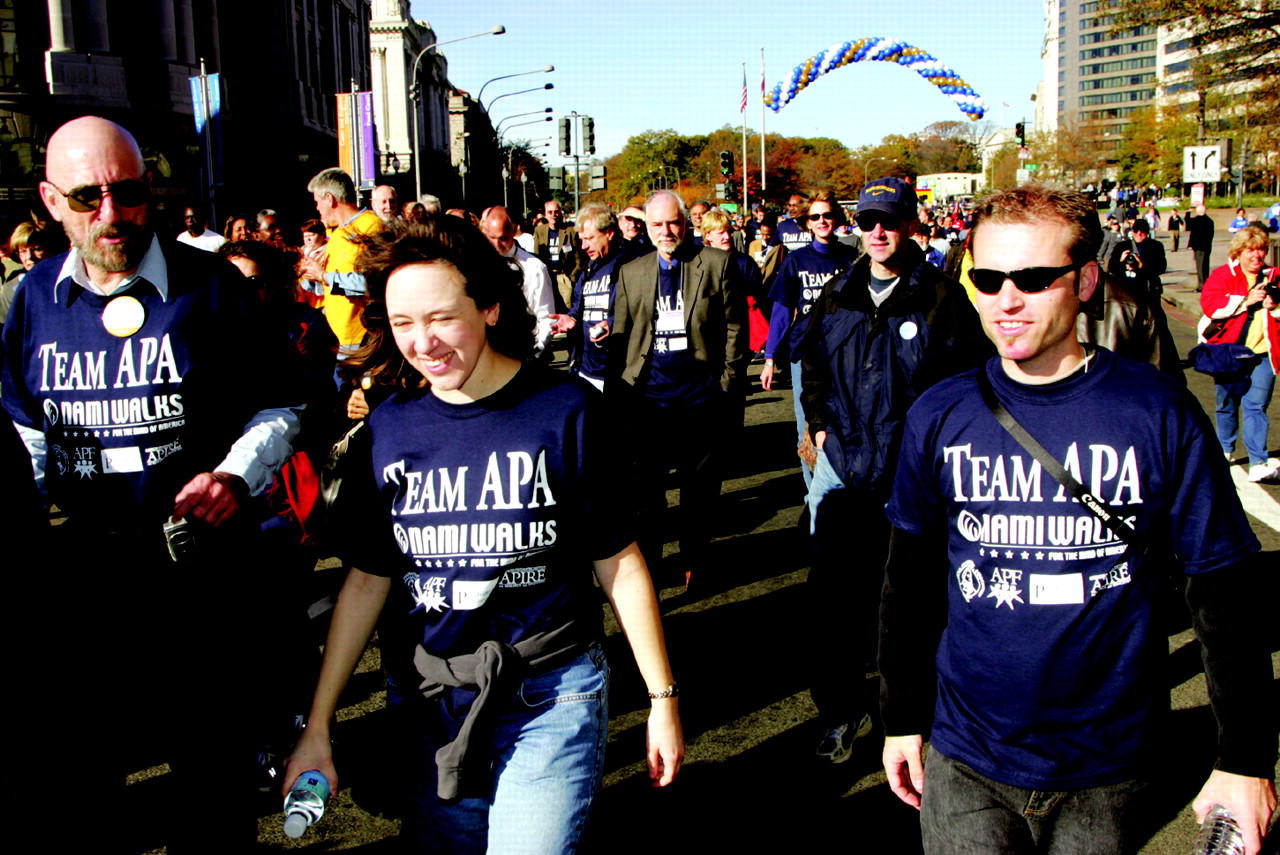Hundreds Walk Pennsylvania Avenue To Raise Mental Illness Awareness
APA leaders and staff were among the hundreds of mental health advocates who donned their walking shoes on November 6 for the first 5-K walkathon sponsored by the National Alliance for the Mentally Ill (NAMI) in the nation's capital.

Assembly members Jeffrey Geller, M.D. (left), Isabel Bergman, M.D., and Guillaume Barbes-Morin, M.D., join Team APA in a walkathon sponsored by the National Alliance for the Mentally Ill last month in Washington, D.C. The walk raised money for psychiatric research and education.
Each year, NAMI organizes as many as 50 walks, called NAMIWalks, in major cities throughout the United States, which are designed to raise funds for advocacy, education, and research initiatives related to mental illness.

James Nininger, M.D., speaker of APA's Assembly, rallies the troops. He emphasized the shared goals of NAMI and APA.
For the D.C. NAMIWalk, APA, the American Psychiatric Foundation (APF), and American Psychiatric Publishing Inc. (APPI), supported the walkathon through a combined contribution of $20,000 (Psychiatric News, November 5). APA was a presenting sponsor at $10,000, and APF and APPI were gold sponsors at $5,000 each.
The morning walk began with a rally on Freedom Plaza, which is located across the street from the J.W. Marriott Hotel, the site of APA's fall Assembly meeting (see Original article: page 14).
Dozens of Assembly members streamed out of the hotel and into the brilliant sunshine to take their place on Freedom Plaza. There, they joined “Team APA,” which, in addition to other APA leaders and staff, included friends, family members, and one dog. Through the fundraising efforts of its members, Team APA contributed nearly $3,000.
“Our communications efforts at APA resulted in having many APA employees and a number of APA members attend the inaugural D.C. NAMIWalks march,” said Eugene Cassel, director of APA's Division of Advocacy.“ We are pleased to have also provided financial support for an event that we hope will continue as a wonderful tradition.”
APA President-elect Steven Sharfstein, M.D., reminded walkers that“ APA loves NAMI” and said the two organizations would continue to work together to finish “overdue, unfinished business,” including the elimination of racial and ethnic barriers to receiving treatment for mental illness and boosting funds for research that will produce more effective treatments for psychiatric disorders.
Sharfstein said NAMI “proves that people can make a difference,” and since the organization began 25 years ago, it“ has provided hope for people with serious and persistent mental illness and their families.”
“Together we must overcome the resistance and inertia in the House of Representatives to get the Wellstone parity act passed now,” he declared. He was referring to the Sen. Paul Wellstone Mental Health Equitable Treatment Act.
James Nininger, M.D., speaker of APA's Assembly, also emphasized the shared goals of the two organizations.
“It seems appropriate that our meeting coincides with this walk,” he said. “Both events are designed to move the field of mental health forward and advocate for treatment and support for patients and their families.”
Nininger acknowledged that the stigma surrounding mental illness was one of the most significant barriers to improving the mental health of Americans.
“The unfortunate reality is that many people don't recognize mental illness or are afraid to accept the fact that either they or a loved one might be suffering,” he said. “If you feel a pain in your chest, you go to a doctor, but if you feel a pain in your soul or confusion or disorganization in your mind, you may not seek treatment for mental illness due to the stigma attached to these disorders.”
The D.C. NAMIWalk was the perfect antidote to such stigma, Nininger pointed out. “When events like this attract a large crowd, it's such a reassuring way of saying it's OK to get help.”
More information about NAMIWalks is posted online at<www.nami.org/template.cfm?section_namiwalks>.▪



